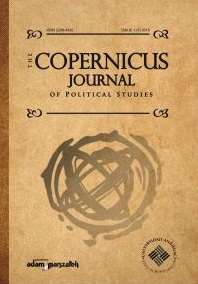The Research on Political Elites: Steady vs. Modern Theories
DOI:
https://doi.org/10.12775/18253Słowa kluczowe
political elites, transition society, emerging democracies, regime change, elite theoriesAbstrakt
The purpose of the article is to address an existing challenge of conducting the research on political elites in modern societies, particularly in the emerging democracies. In addition to a significant gap between theoretical and empirical data, there is also no common vision of the best approach to the research on political elites, especially in transition countries. Most of all, it is caused by the absence of unified common view on the role and distinct functions of political elites in emerging democracies by the scientific world. Consequently, there is a problem with appropriate estimation and conducting analyses of elites’ actions, their weight, and strategy in decision making process towards or backwards to establishing democratic institutions and implication of democratic values. Thus, the article is to describe and analyse main divergence of views on the role, scope and dimension of research of political elites, provided by different theories, namely Marxist one, the classic political elites’ theory and the theory of democratic elitism in accordance with the challenges and requirements of the realities of the current political process.
Full text: http://bazhum.muzhp.pl/czasopismo/589/?idno=14760
Bibliografia
Blondel J., Muller-Rommel F., Political Elites [in:] The Oxford Handbook of Political Behaviour, R. Dalton, H. Klingemann (eds.), Oxford 2007.
Higley J., Burton M., Types of Political Elites in Post-communist Eastern Europe [in:] The Politics of the Post-communist World Vol. II, S. White, D. Nelson (eds.), Burlington 2002
Higley J., Democracy and elites, “Polity” 2006, No. 2.
Higley J., Lengyel G., Elite Configurations after State Socialism [in:] Elites after State Socialism. Theories and Analysis, J. Higley, G. Lengyel (eds.), Lanham 2000.
Higley J., Lengyel G., Elite Theory Versus Marxism, the Twentieth Century’s Verdict [in:] Elites after State Socialism. Theories and Analysis, J. Higley, G. Lengyel (eds.), Lanham 2000.
Krishtanovskaia O., White S., From Nomenclature to New Elite [in:] The New Elite in Post-Communist Eastern Europe, V. Shlapentokh, C. Vanderpool, B. Doktorov (eds.), College Station 2004.
Linz J., Stepan A., Problems of Democratic Transition and Consolidation: Southern Europe, South America, and Post-Communist Europe, Baltimore–London 1997, p. 47.
Paffley M., Rohrschneider R., Elite Beliefs and the Theory of Democratic Elitism [in:] The Oxford Handbook of Political Behavior, R. Dalton, H. Klingemann (eds.), Oxford 2007.
Pettersson T., Pro-democratic Orientations, Political Shortcuts and Policy Issues: Comparative Analyses of Elite-Mass Congruence in Old and New Democracies [in:] Democracy under scrutiny: Elites, citizens, cultures, Ursula van Beek (ed.), Opladen 2010.
Pridham G., The Dynamics of Democratization, London–New York 2000.
Rose R., Mishler W., Representation and Leadership in Post-Communist Political Systems [in:] The Politics of the Post-communist World, S. White, D. Nelson (eds.), Burlington 2002.
Opublikowane
Jak cytować
Numer
Dział
Statystyki
Liczba wyświetleń i pobrań: 0
Liczba cytowań: 0



